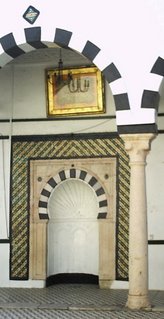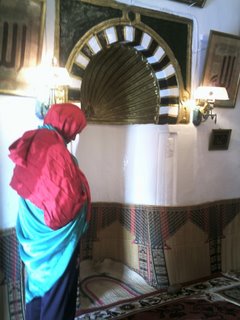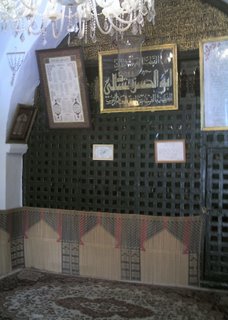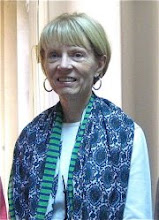A Bit of Sufism
 Politics
PoliticsAnother holiday today. Tuesday, November 7, marks the 19th anniversary of President Zine Al Abidine Ben Ali's assumption of power. Tunisia has freed 29 Islamist prisoners as part of an annual amnesty marking the anniversary of Ben Ali's taking power. All the papers are full of laudatory articles. Tunisia is striking for its lack of public political discourse, while it presents an, an least superficially, Western hospitable face to the world. Tunisia's exact political situation is hard to determine due to the level of silence maintained by the government and the lack of transparency. Tunisians feels very inscure, when talking about politics. this could be explained by the fact that the Tunisian authority imposes numerous restrictions, despite official speeches, on the freedom of speech and on human rights. Control of the internet is one important sign of the pervasive structure of state control. The growth of the internet has been a major issue for Tunisia, with European tourists and ISPs so close by; and the country allows only censored internet access. This censorship bars all materials deemed pornographic, and any chat group references critical of the government.
 Most recently Ben Ali recalled the Tunisian ambassador to Qatar, since Al Jazeera broadcast interviews with an opponent of the regime, Moncef Marzouki, in which Marzouki called for "civil resistance.” President Ben Ali has been in office since 1987 when he deposed Habib Bourguiba, who had been President since Tunisia's inde-pendence from France in 1956. The constitution has been changed twice to allow him to remain in power: initially from two to three terms, and then from three to five. Tunisia is also one of the few Muslim countries (like Azerbaijan and Turkey), where hijabs are prohibited in government buildings. The government forces women wearing hijab either to quit their jobs or for female students to drop out of school if they insist on wearing it. They force females with veils to sign a document in which they admit having committed a crime punishable by law and, in case of recidivism, would go to jail. The Tunisian state and private media are largely critical of women who insist on keeping their veils despite all threats.
Most recently Ben Ali recalled the Tunisian ambassador to Qatar, since Al Jazeera broadcast interviews with an opponent of the regime, Moncef Marzouki, in which Marzouki called for "civil resistance.” President Ben Ali has been in office since 1987 when he deposed Habib Bourguiba, who had been President since Tunisia's inde-pendence from France in 1956. The constitution has been changed twice to allow him to remain in power: initially from two to three terms, and then from three to five. Tunisia is also one of the few Muslim countries (like Azerbaijan and Turkey), where hijabs are prohibited in government buildings. The government forces women wearing hijab either to quit their jobs or for female students to drop out of school if they insist on wearing it. They force females with veils to sign a document in which they admit having committed a crime punishable by law and, in case of recidivism, would go to jail. The Tunisian state and private media are largely critical of women who insist on keeping their veils despite all threats.Sufi Mosque
I visited the tomb and mosque (or zawiya) built in honor of Sidi Abul Hassan Ash-Shadhili, founder of a tariqa (mystical order or brotherhood). It is called simply Sidi Belhassen and is located in the Jellez cemetery, where Moncef Bey (Bey of Tunis from 1881 - 1948) and the second wife of Habib Bourgiba, Wassila, are also buried. The complex sits a big hill (the Tunisians call it a mountain) with a terrace overlooking the city. The Tariqa Ash-Shadhiliya is the Sufi order founded by Ash-Shadhili. Followers, or murids (seekers), of the Shadhiliya, are often known as Shadhilis. It is the most popular Sufi order in North Africa. The sheikh was known for his baraka (grace), performing miracles (karamat), and living as an ascetic. Many who are not members of the brotherhood also visit the shrine.
 The holy place was not open, when I arrived. However, a man sought the guardian and said that I could visit for a donation. Two women, one with a small boy in a beige hooded sweat jacket, gave a donation and drank water from a cup (drawn from a well in the mosque’s courtyard) and entered the carpeted room with the tomb. To enter the room I, likewise, removed my shoes and approached reverently. The woman with the small boy quickly approached the lattice barrier protecting the covered shrine and, with hands across her chest and then reaching up from the elbows, undertook a serious conversation with the supernatural. The other woman put on a satin cloak, prayed while standing, and then prostrated (hands on knees, lowering slowly to kneeling position, then touching forehead, nose and palms to ground). Supposedly, there is a lower mosque as well, built over the cave used by the saint as a place of spiritual retreat and where he had one of his visions of Muhammad. My taxi driver said that the mosque is open on Thursdays. Women go in the morning and men in the afternoon.
The holy place was not open, when I arrived. However, a man sought the guardian and said that I could visit for a donation. Two women, one with a small boy in a beige hooded sweat jacket, gave a donation and drank water from a cup (drawn from a well in the mosque’s courtyard) and entered the carpeted room with the tomb. To enter the room I, likewise, removed my shoes and approached reverently. The woman with the small boy quickly approached the lattice barrier protecting the covered shrine and, with hands across her chest and then reaching up from the elbows, undertook a serious conversation with the supernatural. The other woman put on a satin cloak, prayed while standing, and then prostrated (hands on knees, lowering slowly to kneeling position, then touching forehead, nose and palms to ground). Supposedly, there is a lower mosque as well, built over the cave used by the saint as a place of spiritual retreat and where he had one of his visions of Muhammad. My taxi driver said that the mosque is open on Thursdays. Women go in the morning and men in the afternoon.Sidi Bou Said
After that, I took the commuter (TGM) train to Sidi Bou Said, a charming blue and white village, with decorated doors, perched on the cliffs overlooking the Bay of Tunis, just 20 minutes from the capital. I perused some of the shops and then returned to Tunis to prepare for another day.


0 Comments:
Post a Comment
<< Home